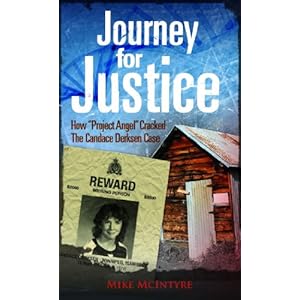 |
| Cover of Journey for Justice. |
The book feels like it has two sections with two different styles of writing. The first section deals with the initial disappearance of Candace, and the search for her. This section reads much like a regular novel.
As this was the first true-crime book I've ever read, I wasn't expecting this style at all. I was pleasantly surprised. I think the style works because it kept me interested in what would happen next, as it was told as a story. It also made me feel a connection to the characters, as McIntyre used lots of dialogue, much of it from Wilma Derksen's (Candace's mother) own book, Have You Seen Candace?
The second section looks at the trial of Mark Grant. I lost some of my interest reading this part because it was written the way I expected a true-crime book to be written: lots of facts, legal jargon, newspaper articles, and psychiatric reports. While some of these things were interesting, a lot of it was over my head or repetitive.
The main thing this section loses out on, is the connection to the characters I felt in the first part of the book.
I think that journalists can learn the importance of emotional content from this book. While getting the facts straight is the top priority of a journalist, it is only the skeleton of a story. I believe that all stories can be improved by the thoughts and feelings of the people involved in the story. This is why I enjoyed the first half of the book more than the second.
I saw a documentary called Dear Zachary: A Letter to a Son About His Father, which also deals with a murder case. When I compare these two works, it strengthens my thoughts on emotional value. Dear Zachary shows the struggle of a murdered man's parents to gain custody of his daughter from the woman they believe murdered him.
Seeing how they feel and think is what makes the film so interesting. They also give factual information, but it doesn't bog down the story like the end of Journey for Justice. Although, I did feel that Journey for Justice felt like much more of a journalism piece than Dear Zachary, as the director of Dear Zachary was a friend of the deceased and very involved in the story.
After reading Journey for Justice, Mike McIntyre and Wilma Derksen came to Red River to speak to us. It was interesting to hear how the book came to be, but I would have liked to hear more of what Wilma had to say, as McIntyre did most of the talking. I was amazed reading the book and listening to Wilma speak, at how loving and forgiving she is. It's hard for me to understand how she doesn't, and never did, let anger towards Grant overwhelm her.
Overall, the book was a very interesting read and I recommend it to anyone who enjoys true-crime books, or those who haven't read one. It was nice to see that good story telling can thrive in these kinds of books.
No comments:
Post a Comment